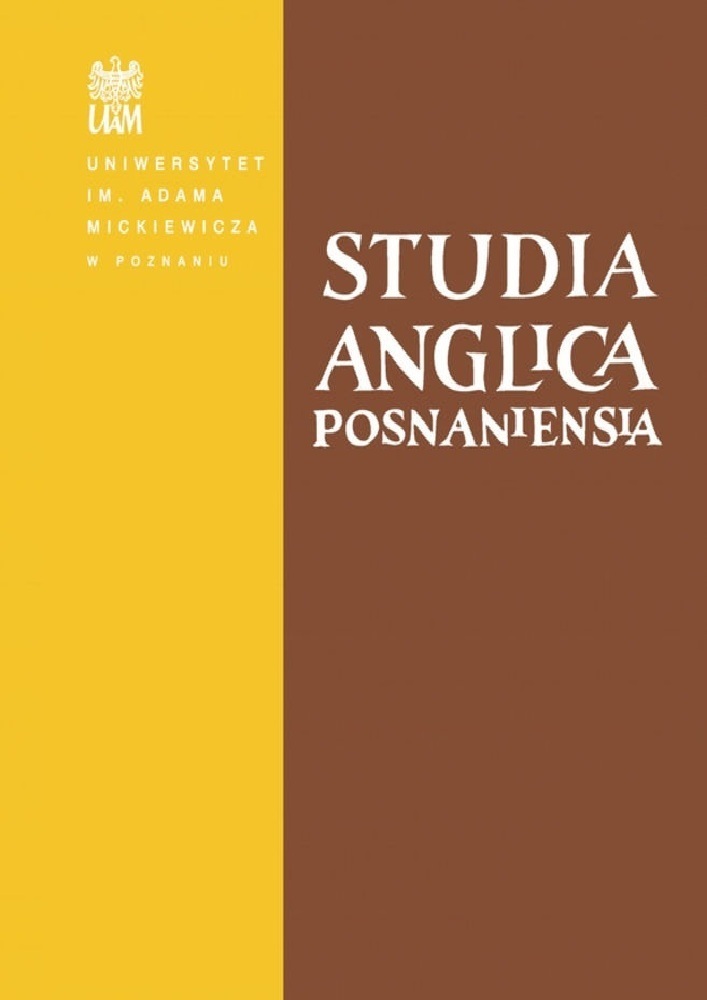Abstract
Bliss & Frantzen’s (1976) paper against the previously assumed textual integrity of Resignation has been a watershed in research upon the poem. Nearly all subsequent studies and editions have followed their theory, the sole dissenting view being expressed by Klinck (1987, 1992). The present paper offers fresh evidence for the textual unity of the poem. First examined are codicological issues, whether the state of the manuscript suggests that a folio might be missing. Next analysed are the spellings of Resignation and its phonology, here the paper discusses peculiarities which both differentiate Resignation from its manuscript context and connect the two hypothetical parts of the text. Then the paper looks at the assumed cut-off point at l.69 to see if it may provide any evidence for textual discontinuity. Finally the whole Resignation, seen as a coherent poem, is placed in the history of Old English literature, with special attention being paid to the traditions of devotional texts and the Old English elegies.
References
Braekman, Willy. 1965. Some minor Old English texts. Archiv für das Studium der neueren Sprachen und Literaturen 202. 271-276.
Dobbie, Elliott Van Kirk. 1942. The Anglo-Saxon minor poems. New York: Columbia University Press.
Keefer, Sarah L. 2010. Old English liturgical verse. A student edition. Peterborough, Ont.: Broadview Press.
Klinck, Anne L. 1992. The Old English elegies. A critical edition and genre study. Montreal: McGill-Queen’s University Press.
Krapp, George P. 1932. The Paris Psalter and the Meters of Boethius. New York: Columbia University Press.
Kuypers, Arthur B. 1902. The prayer book of Ædeluald the bishop, commonly called ‘The Book of Cerne’. Cambridge: Cambridge University Press.
Malmberg, Lars. 1979. Resignation. Durham: Durham and St. Andrews Medieval Texts.
Muir, Bernard J. 1994. The Exeter anthology of Old English poetry. Exeter: University of Exeter Press.
Muir, Bernard J. 2006. The Exeter anthology of Old English poetry. Exeter: University of Exeter Press. DVD.
Noronha, Thomas L. 1971. Five Old English verse prayers: An edition. Stanford, Calif.: Stanford University dissertation.
Sweet, Henry. 1883. King Alfred’s Orosius. London: Trübner.
Thorpe, Benjamin. 1842. Codex Exoniensis. London: Pickering.
Banks, Ronald A. 1968. A study of the Old English versions of the Lord’s Prayer, the Creeds, the Gloria, and some prayers found in British Museum MS. Cotton Galba A. xiv. London: University of London dissertation.
Bestul, Thomas H. 1977. The Old English Resignation and the Benedictine Reform. Neu-philologische Mitteilungen 78. 18-23.
Bliss, Alan J. and Allen J. Frantzen. 1976. The integrity of Resignation. The Review of English Studies 27. 385-402.
Bloomfield, Morton. 1970. Essays and explorations: Studies in ideas, language, and literature. Cambridge, Mass.: Harvard University Press.
Bosworth, Joseph and Thomas N. Toller. 1898. An Anglo-Saxon dictionary. Oxford: Clarendon.
Brown, Michelle P. 1996. The Book of Cerne: Prayer, patronage and power in ninth-century England. London: British Library; Toronto, Buffalo: University of Toronto Press.
Cameron, Angus, Ashley C. Amos and Antonette diPaolo Healey. 2003. The dictionary of Old English: A to F. Toronto, Ont.: Pontifical Institute of Mediaeval Studies. CD.
Campbell, Alistair. 1959. Old English grammar. Oxford: Clarendon.
Coveney, Dorothy K. 1958. The ruling of the Exeter Book. Scriptorium 12. 51-55.
Förster, Max. 1933. General description of the manuscript. In Raymond Wilson Chambers, Max Förster and Robin Flower. The Exeter Book of Old English poetry. 55-67. London: Lund.
Greenfield, Stanley. 1966. A Critical History of Old English Literature. London: University of London Press.
Gretsch, Mechthild. 2008. A context for Resignation A? In Virginia Blanton and Helene Scheck (eds.). Intertexts: studies in Anglo-Saxon culture presented to Paul E. Szarmach, 103-117. Tempe, Az.: Arizona Center for Medieval and Renaissance Studies.
Hogg, Richard. 1992. A grammar of Old English, vol. 1. Oxford: Blackwell.
Keefer, Sarah L. 1998. Respect for the book: A reconsideration of ‘form’, ‘content’, and ‘context’ in two vernacular poems. In Sarah L. Keefer and Katherine O’Brien O’Keeffe (eds.). New approaches to editing Old English poetry, 21-44. Woodbridge: Boydell.
Ker, Neil R. 1957. Catalogue of manuscripts containing Anglo-Saxon. Oxford: Clarendon.
Klinck, Anne L. 1987. Resignation: Exile’s Lament or Penitent’s Prayer?. Neophilologus 71. 423-430.
Malone, Kemp. 1930. When did Middle English begin?. Language Monograph 7. 110-117.
Mitchell, Bruce. 1985. Old English syntax. Oxford: Clarendon.
Mora, María. 1995. The invention of the Old English elegy. English Studies 76. 129-139.
Muir, Bernard J. 1989. A preliminary report on a new edition of the Exeter Book. Scriptorium 43. 273-288.
Pickwoad, Nicholas. 2006. Report on the preparation of Exeter D&C MS 3501 for digitisation. In Bernard James Muir. The Exeter anthology of Old English poetry. Exeter: University of Exeter Press. DVD.
Quirk, Randolph and Charles L. Wrenn. 1955. An Old English grammar. London: Methuen.
Raw, Barbara. 1978. The art and background of Old English poetry. London: Arnold.
Schlauch, Margaret. 1956. English medieval literature and its social foundations. Warszawa: Państwowe Wydawnictwo Naukowe.
Sisam, Kenneth. 1945. Seafarer, lines 97-102. The Review of English Studies 21. 316-317.
Stanley, Eric G. 1955. Old English poetic diction and the interpretation of The Wanderer, The Seafarer and The Penitent’s Prayer. Anglia 73. 413-466.
Toller, Thomas N. 1921. An Anglo-Saxon dictionary. Supplement. Oxford: Clarendon.
Whitelock, Dorothy. 1950. The interpretation of The Seafarer. In Cyril Fox and Bruce Dickins (eds.). The early cultures of north-west Europe, 259-272. Cambridge: Cambridge University Press.
